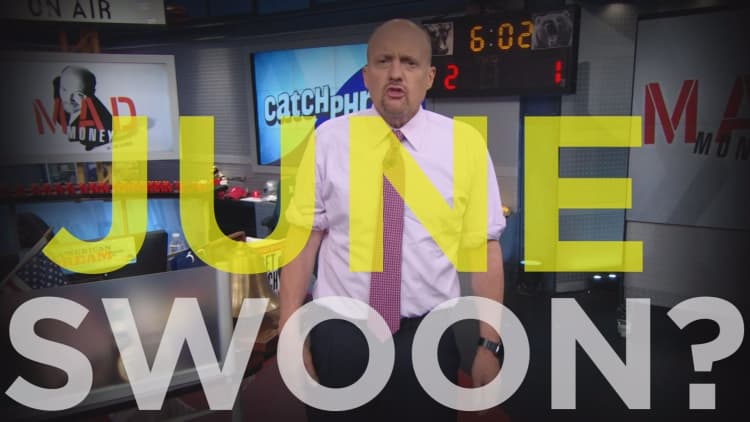
Now that the "sell in May and go away" theory didn't play out in May, Jim Cramer is hearing chatter of "lighten up in June before the swoon."
Cramer hates these poetic tidbits. If they didn't rhyme, no one would even pay attention to them. The real problem is what Cramer refers to as complacent bearishness. It is always so much easier to be publicly bearish than it is to be bullish in this market.
"The fact is, the most complacent people are the ones who presume that stocks that drop are finished and the market's swoons are all prologues to gigantic declines that must be sidestepped — or else," the "Mad Money" host said.
In fact, this year has been a series of roving bear markets, followed by thriving bull markets. One-by-one, each sector was taken down, regardless of the calendar. Oil, technology, retail, materials, biotech, consumer packaged goods. And with exception of retail, Cramer considered each sell-off to be a buying opportunity.
"I don't want to scare you away from stocks when any kind of pullback can create some terrific buying opportunities. That strategy might not be alliterative, but I think it is right," Cramer said.
Read More Cramer: Complacent bearishness plaguing stocks—you could be missing opportunity
Typically, the technology sector is divided between companies branded as old tech and those deemed to be new. Cramer has found that investors often ignore the old tech, and only focus on the newer companies offering sexier growth.
But old tech offers something that newer tech does not: value.
Companies like Cisco, Intel and IBM have cheap stocks and yields in excess of 3 percent.
"In other words, they are a totally different kind of investment," the "Mad Money" host said.
Cramer turned to Tim Collins, a technician and colleague at RealMoney.com, who pointed out that there is no need to choose between old and new technology. Collins noted that owning one value tech stock and one growth tech stock could be what investors need for a diversified portfolio.
"The truth is, you should be looking for opportunities wherever they can be found," Cramer said.
Read More Cramer's battle of old vs new technology: Why the charts say you need both
Suddenly everyone only cares about cars, too. Cramer finds it remarkable how quickly the automobile has moved into scope as the next big thing in technology, perhaps taking the place of cellphones.
And Cramer totally gets it. Tesla seems like the most exciting thing that has happened to the world of automobiles since the Model T.
"I have been saying that Tesla is a cult stock for ages, meaning that there is no logical way to explain how and where it trades," Cramer said.
But that doesn't mean Cramer is recommending Ford or General Motors, either.
For those investors who want to play the connected technology car with a stock, Cramer recommended NXP Semiconductors. Last year it shelled out $12 billion to acquire Freescale and became the top automobile related semiconductor company.
Read More Cramer: Love Tesla? Here's your play on the connected car
This week Cramer also had his eye on duopolies, industries with two dominant players. The key to a duopoly is that while both companies tend to do well, one will often do better than the other.
One space with a duopoly is the off-price retail space with both TJX and Ross Stores at the top. TJX is the parent of TJ Maxx, Marshalls and HomeGoods. Ross Stores has both Ross Dress for Less and DD's Discounts.
"I like to think of these two companies as the vultures of the retail sector," Cramer said.
For the past few years, Ross Stores has been ahead of TJX, with its stock rallying 14 percent in 2015. However, in 2016 TJX has moved into the lead, up 8 percent for the year while Ross Stores has declined.
"I say stick with TJX and leave Ross in the penalty box until management can work their magic of yore," Cramer said.
Most health care stocks are struggling right now, but the medical device cohort has been on fire. NuVasive is a medical device firm that focuses on minimally invasive spinal surgery that treats patients with debilitating spinal conditions.
NuVasive CEO Greg Lucier took over just over a year ago. He previously was the CEO of Life Technologies, which he ran for 11 years before selling the business to Thermo Fisher for a large premium. If he can do the same for NuVasive's shareholders, this stock must be bought, Cramer said.
Lucier spoke with Cramer and explained the benefits of the company's technology and the impact on the quality of life for both children and adults.
"No one wants to go in for back surgery, but done right, it absolutely restores the vitality of life … the technology is not just for kids, it's for everyone," Lucier said.
In the Lightning Round, Cramer gave his take on a few caller-favorite stocks:
Monsanto: "Just stay long. I'm typically not an arbitrager but everything I listen to and my partner David Faber makes me think that there's something coming. You probably want to be in MON."
Secureworks Corp: "I am so gun shy on cybersecurity, I'm just going to go back to Cyberark. We had Palo Alto on the show last night and I thought he told a great story. Does anybody really care? I do, but I don't want to push the group hard."




